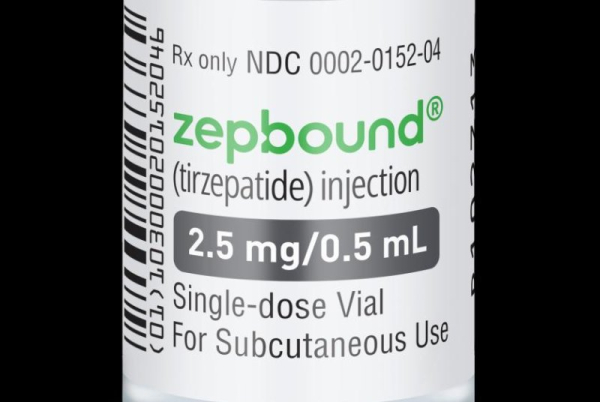
The Food and Drug Administration has approved Zepbound, a GLP-1 weight-loss drug from Eli Lilly & Co., for the treatment of moderate to severe sleep apnea certain patients with obesity. Photo courtesy Eli Lilly & Co.
Zepbound, the new GLP-1 weight-loss drug from Eli Lilly & Co., has been approved by the Food and Drug Administration for treating moderate to severe obstructive sleep apnea.
The agency issued its decision on Friday, giving the stamp of approval for Zepbound’s use among adults with obesity for use in combination with a reduced-calorie diet and increased physical activity. Advertisement
“Today’s approval marks the first drug treatment option for certain patients with obstructive sleep apnea,” said Dr. Sally Seymour of the FDA’s Center for Drug Evaluation and Research. “This is a major step forward for patients with obstructive sleep apnea.”
“Today, many cases of OSA go undiagnosed and untreated, leaving millions at risk for serious health consequences,” added Patrik Jonsson, president of Lilly Cardiometabolic Health and Lilly USA. “Zepbound is the first medication that significantly improves moderate-to-severe OSA and aids in long-term weight loss in adults with obesity. Advertisement
“Nearly half of clinical trial patients saw such improvements that they no longer had symptoms associated with OSA, marking a critical step forward in reducing the burden of this disease and its interconnected health challenges,” Jonsson said.
Lilly’s drug tirzepatide, brand-named Zepbound, is currently used to help patients lose weight and manage diabetes. The class of Glucagon-like peptide-1, or GLP-1, meds also includes Zepbound’s main competitors in the booming weight-loss drug sector, such as Novo Nordisk’s Ozempic and Wegovy.
This blockbuster class of GLP-1 drugs have been hailed as “transformative” in their effectiveness in healthcare associated with obesity, which is projected to cost Americans $385 billion this year. By 2020 an estimated 42% of Americans were obese and another 31% were overweight — meaning that nearly three-quarters of all adults are not at a healthy body weight.
In November, the Biden administration proposed that the drugs be covered by Medicare and Medicaid, a move that would have to be approved by the incoming Trump administration.
Rapid weight loss has been a hallmark of these medications, which work, in part, by making users feel full earlier by activating receptors of hormones secreted from the intestine (GLP-1) and glucose-dependent insulinotropic polypeptide (GIP) to reduce appetite and food intake. Advertisement
As a result, prescriptions of GLP-1 diabetes and weight-loss medications more than doubled between 2022 and 2023.
Meanwhile, they have also been found to be helpful for other indications ranging from lowering the risk of Alzheimer’s disease to easing knee arthritis pain to curbing asthma.
Friday’s FDA approval of Zepbound for treating moderate to severe sleep apnea came after the SURMOUNT-OSA phase 3 clinical trials — two randomized, double-blind, placebo-controlled studies of 469 adults without type 2 diabetes.
One study enrolled participants using the standard “PAP” treatment for sleep apnea, in which a machine is employed to deliver pressurized air through a mask to keep the airway open while asleep. The other study enrolled participants unable or unwilling to use PAP.
In both studies, participants randomly received either 10 or 15 milligrams of Zepbound or placebo once weekly for 52 weeks. Results were measured by how many times a person stopped breathing (apnea) or breathed shallowly (hypopnea) per hour during sleep at week 52.
At the end of period in both studies, participants who received Zepbound experienced a statistically significant and clinically meaningful reduction in events of apnea or hypopnea compared with placebo. Also, a greater proportion of participants treated with Zepbound achieved remission or mild sleep apnea with resolution of symptoms compared to placebo. Advertisement
Participants treated with Zepbound also had a significant decrease in body weight compared with placebo at 52 weeks. The improvement in participants with OSA is likely related to body weight reduction with Zepbound, the FDA found.